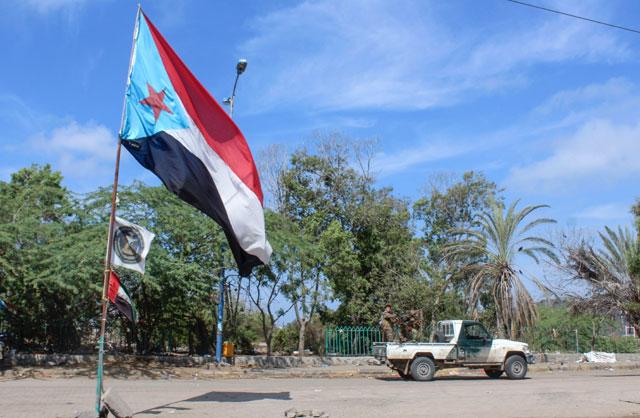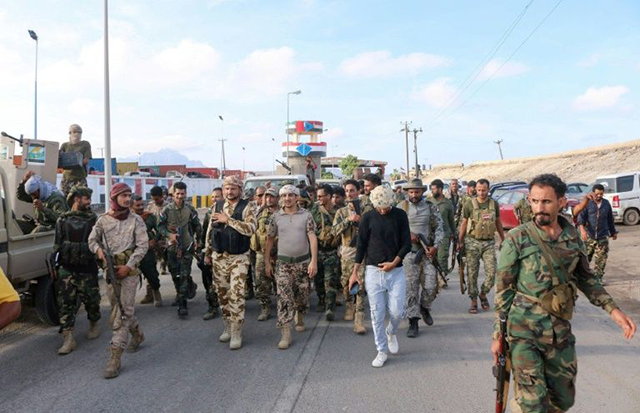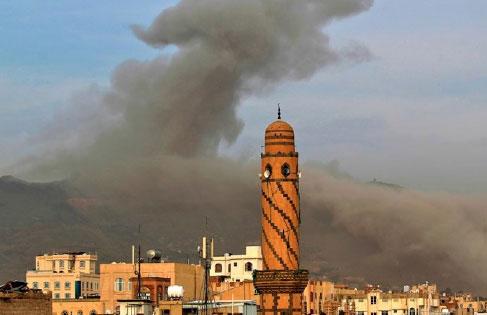You are here
Yemen's new government: divisions and common ground
By AFP - Dec 31,2020 - Last updated at Dec 31,2020

Fighters with the Saudi-backed coalition man a checkpoint in Dar Sad, north of Yemen's southern city of Aden on December 31, 2020 (AFP photo)
DUBAI — The newly-formed Yemeni government, which was targeted in a deadly attack just two weeks after its formation, faces towering political, security and economic challenges.
Not least is Yemen's ongoing conflict, which was once again highlighted on Wednesday as explosions killed at least 26 people and wounded scores as ministers disembarked from an aircraft in the southern city of Aden.
Who is in the new Cabinet?
The power-sharing government was created to address deep divisions within the camp fighting Iran-backed Houthi rebels in the country's north.
It came about under the auspices of Saudi Arabia, which has been leading a military coalition against the Iran-backed Houthis since 2015.
Prime Minister Moeen Abdulmalik Saeed has retained his position in the new government, which comprises 24 members including ministers loyal to President Abedrabbo Mansour Hadi and supporters of the secessionist Southern Transitional Council (STC), as well as other parties.
Maged Al-Madhaji of the Sanaa Centre for Strategic Studies told AFP the new cabinet "is significant in that it reflects all sides".
He added its mandate would cover all areas under the control of pro-government forces.
The STC has long sought a return to an independent south Yemen, which had ended with Yemen's unification in 1990.
But Riyadh has been encouraging the new government to bolster the coalition against the Huthis, who are poised to seize the key town of Marib, the last government stronghold in the north.
"Saudi Arabia is the main guarantor that the unity government will last," Madhaji said.
What are the cabinet's priorities?
The imminent threat of famine has made the majority of Yemenis dependent on some form of aid for survival, a situation the United Nations calls the world's worst humanitarian crisis.
The economy has also been hit by inflation, with Yemen's currency plummeting from around 610 riyals to the US dollar in January to some 675 today. That has placed many essential goods out of reach.
The new government "must stop the bleeding of the Yemeni currency against the dollar and fix the economic conditions" in government-held areas, he said.
He added it should "remove heavy military equipment from Aden and its outskirts", where they have been used in clashes between anti-rebel factions, and re-deploy them to front lines against the Houthis.
Finally, Madhaji said the government must stop "losing ground" to the Houthis, who are advancing on several fronts.
What are the main challenges?
Saudi Arabia has been pushing for a power-sharing government in Yemen for more than a year, to forge a joint front against the Houthi rebels, who have in recent months stepped up attacks on the kingdom.
The government faces military challenges in regaining lost ground and stopping the rebels' advances.
In March, the rebels seized Al Hazm, provincial capital of Al Jawf province north of Sanaa, after heavy fighting with government troops.
But the biggest challenge is the ability "to maintain a unity government and overcome the political divisions between the parties within it", said Madhaji.
The separatists have repeatedly accused Hadi's government of allowing Islamists, especially the Muslim Brotherhood-linked Al Islah Party, to influence their political and military decisions.
But Madhaji said Wednesday's attack could be a "chance to unite the government behind the idea that there is a more dangerous enemy against them all".
Related Articles
DUBAI — Yemen's southern separatists said on Wednesday they had withdrawn from talks over a Saudi-sponsored power-sharing deal with the inte
ADEN — Yemeni separatists early Sunday declared self-rule of the country's south as a peace deal with the government crumbled, complicating
RIYADH — Yemen's internationally recognised government and southern separatists will form a Cabinet within a week as part of a Saudi-sponsor



















